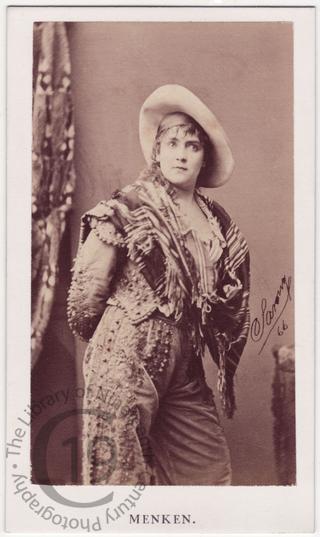
Adah Isaacs Menken
A carte-de-visite portrait of Adah Isaacs Menken, seen here dressed as she appeared in Les pirates de la Savane [The Pirates of the Savannah].
Born Dolores Adios Fuertes near New Orleans in 1835, Menken’s father was a Spanish Jew, and her mother from Bordeaux, so she grew up speaking French and Spanish. When she was seven she made a successful appearance as a dancer with her sister Josephine. During her early career on the stage she visited Havana, where she became popular, and was known as the ‘Queen of the Plaza’. After playing in Texas and Mexico she returned to New Orleans, retired from the stage, and published a volume of poems entitled Memories, under the name ‘Indigena.’. While in Galveston, in 1856, she married Alexander Isaacs Menken, a musician, from whom she was subsequently divorced in Nashville, Tennessee. Returning to the stage, she appeared at the Varieties theatre in New Orleans during the season of 1858. After a period appearing as a leading lady on the southern circuit, she entered a studio in Columbus, Ohio, in order to study sculpture. On 3 April 1859 in New York, she married John C. Heenan, the pugilist, but in 1862 was divorced from him by an Indiana court. She made her first appearance in New York in June 1859, next touring throughout the west and south, and then returning to New York, where she married Robert H. Newell. In 1863 she appeared in California, then in the following year she went to England where she was immediately engaged at Astley's theatre, London, in the role of Mazappa. In 1865 she was divorced from Newell. In 1866 she again visited New York, where she reprised Mazeppa, but terminated her engagement abruptly, leaving for a brief tour through the west. On 21 August, 1866, she married James Barclay, at her residence in New York, and the same year again sailed for England. She died in the Jewish faith in Paris on 10 August 1868 and was buried in Montparnasse cemetery. On her tomb, at her request, were engraved the words ‘Thou Knowest’.
Photographed by Napoleon Sarony of New York.
Code: 124548




